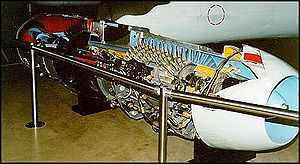Junkers Jumo 004
| Jumo 004 | |
|---|---|
 |
|
| Cutaway example of a Junkers Jumo 004 jet engine at the National Museum of the U.S. Air Force, Wright-Patterson AFB, Ohio. | |
| Type | Turbojet |
| Manufacturer | Junkers |
| First run | 1940 |
| Major applications |
Messerschmitt Me 262 Arado Ar 234B |
The Junkers Jumo 004, was the world's first production turbojet engine in operational use, and the first successful axial compressor turbojet engine. Some 8,000 units were manufactured by Junkers in Germany during late World War II, powering the Messerschmitt Me 262 fighter and the Arado Ar 234 reconnaissance/bomber, along with prototypes, including the Horten Ho 229. Variants and copies of the engine were produced in Eastern Europe and the USSR for several years following the end of WWII.
The feasibility of jet propulsion had been demonstrated in Germany in early 1937 by Hans von Ohain working with the Heinkel company. Most of the Reich Air Ministry (RLM) remained uninterested, but Helmut Schelp and Hans Mauch saw the potential of the concept and encouraged Germany's aero engine manufacturers to begin their own programmes of jet engine development. The companies remained skeptical and little new development was carried out.
In 1939 Schelp and Mauch visited the companies to check up on progress. Otto Mader, head of the Junkers Motorenweke (Jumo} division of the large Junkers aviation firm, stated that even if the concept was useful, he had no one to work on it. Schelp responded by stating that Dr Anselm Franz, then in charge of Junkers' turbo- and supercharger development, would be perfect for the job. Franz started his development team later that year, and the project was given the RLM designation 109-004 (the 109- prefix, assigned by the RLM was common to all reaction engine projects in WW II Germany, and was also used for German WW II rocket engine designs for manned aircraft).
...
Wikipedia
